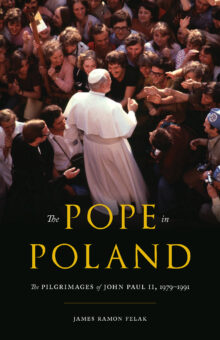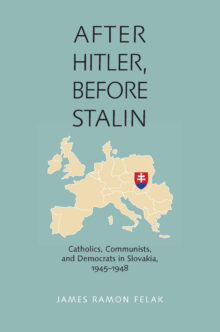
James Ramon Felak
James Ramon Felak is Newman Center Term Professor in Catholic Christianity at the University of Washington and the author of At the Price of the Republic: Hlinka’s Slovak People’s Party, 1929-1938 and After Hitler, Before Stalin: Catholics, Communists, and Democrats in Slovakia, 1945-1948.
The Pope in Poland
The Pilgrimages of John Paul II, 1979-1991
John Paul II was the first non-Italian pope in over 500 years, and the first Slavic pontiff in history. Shortly after his election to the papacy in 1978, he launched a series of visits to his native Poland, then in the midst of dramatic social changes that heralded the end of Communism. In this groundbreaking book, James Ramon Felak carefully examines the Pope’s first four visits to his homeland in June of 1979, 1983, 1987, and 1991 in the late Communist and immediate post-Communist period. Careful analysis of speeches, press coverage, and documents from the Communist Party, government, and police show how the Pope and the Communist authorities engaged one another. Felak gives equal attention to John Paul’s political and religious messages, highlighting how he astutely maneuvered between the rising hopes of the Polish people and the dangerous fears of a dying regime. The Pope in Poland recreates and explicates these dramatic visits that played a major role in the collapse of Communism in Poland as well as laid out a papal vision for Poland’s post-Communist future.
After Hitler, Before Stalin
Catholics, Communists, and Democrats in Slovakia, 1945–1948
After Hitler, Before Stalin examines the crucial postwar period in Slovakia, following Nazi occupation and ending with the Communist coup of February1948. Centering his work around the major political role of the Catholic Church and its leaders, James Ramon Felak offers a fascinating study of the interrelationship of Slovak Catholics, Democrats, and Communists. He provides an in-depth examination of Communist policies toward Catholics and their strategies to court Catholic voters, and he chronicles the variety of political stances Catholics maintained during Slovakia's political turmoil.Felak opens by providing a background on pre-war and wartime Slovak politics, notably the rise of Slovak Catholic nationalism and Slovakia's alignment with Nazi Germany during World War II. He then describes the union formed in the famed “April Agreement” of 1946 between the Democratic Party and Catholics that guaranteed a landslide victory for the Democrats and insured a position for Catholics in the new regime. Felak views other major political events of the period, including: the 1947 Czechoslovak war crimes trial of Father Jozef Tiso; education policy; the treatment of the Hungarian minority; the trumped-up “anti-state conspiracy” movement led by police in the Fall of 1947; and the subsequent Communist putsch.Through extensive research in Slovak national archives, including those of the Democratic and Communist parties, After Hitler, Before Stalin assembles a comprehensive study of the predominant political forces and events of this tumultuous period and the complex motivations behind them.


